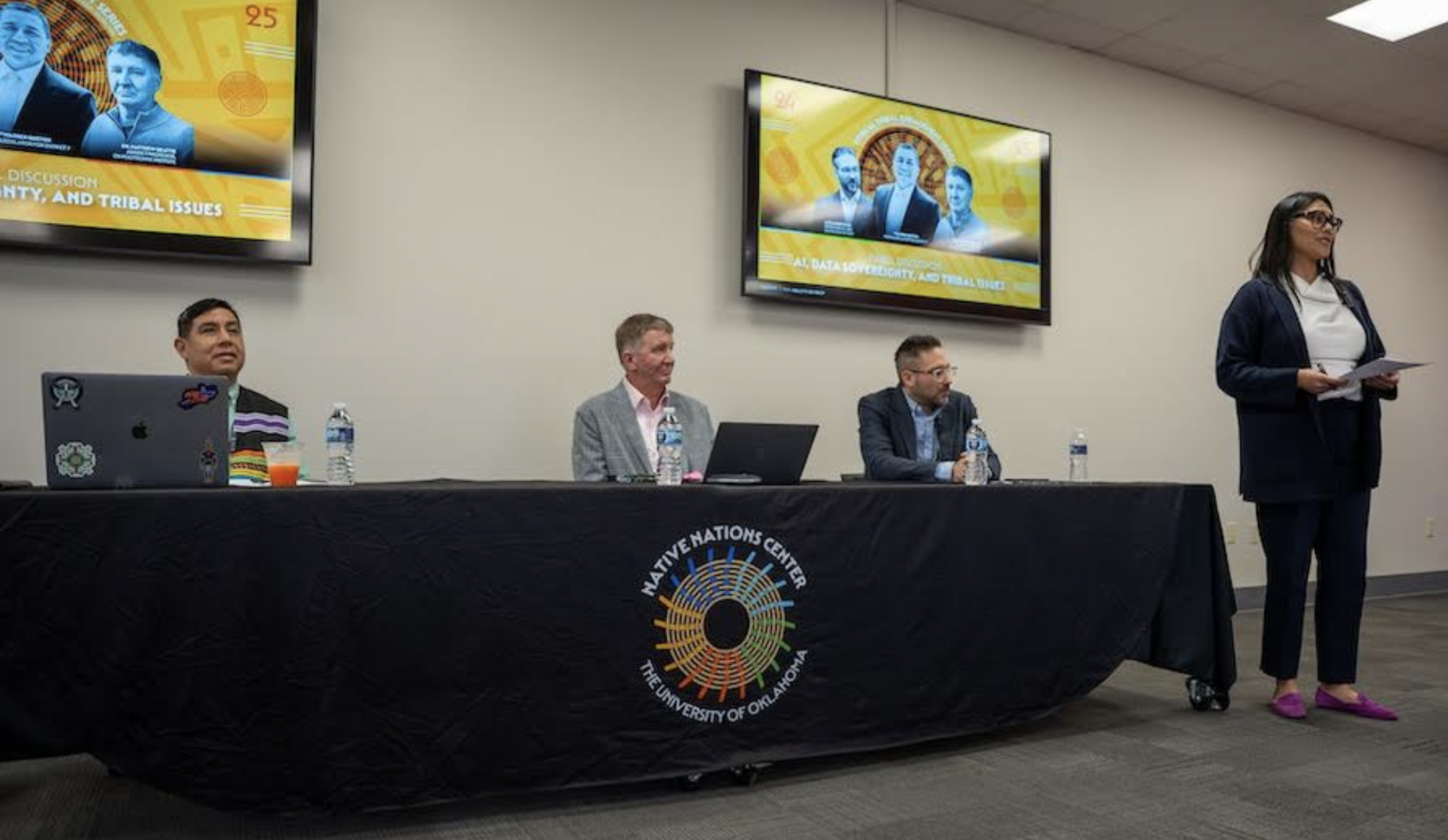
- Details
- By Native News Online Staff
The University of Oklahoma hosted the Ethical Tribal Engagement Series on March 5, convening tribal leaders, legal experts, and university faculty to explore the crucial intersection of artificial intelligence, data sovereignty, and tribal governance.
Titled “AI, Data Sovereignty, and Tribal Issues,” the event featured a panel of three speakers who discussed the impact of emerging technologies on Tribal Nations and strategies for safeguarding tribal data and cultural heritage.
“The Office of Tribal Relations, and specifically the Native Nations Center for Tribal Policy Research, embraces discussions around innovative technologies, such as artificial intelligence. We were excited to bring together AI, legal, and tribal experts to talk about the challenges and opportunities around AI and machine learning. Our goals for the event were twofold: that attendees learned more about tribes and university expertise, and that we helped plant a seed for future discussions about these emerging topics.” OU offers the Ethical Tribal Engagement Series to strengthen the relationships between the university and Tribal Nations. Our goal is to enhance both our current and future interactions with tribes,” said Tana Fitzpatrick, J.D., (Crow/Lakota/Ponca/Chickasaw), associate vice president of Tribal Relations and director of the Native Nations Center for Tribal Policy Research.
Matthew Beattie, Ph.D., a faculty member at the OU Polytechnic Institute and Gallogly College of Engineering, addressed the implications of AI on Tribal data sovereignty. He questioned whether platforms like ChatGPT have trained on Tribal Nations’ publicly available content, including policy documents and cultural materials. He emphasized the importance of tribal leaders understanding how AI systems collect and utilize data, urging caution in sharing sensitive information online.
AI enhances visibility but also poses risks of misinformation and loss of control over tribal knowledge, Beattie explains. He cautioned that when Tribal Nations share information publicly, companies like ChatGPT may use that content for training their AI models.
“Do not assume the training models will get your tribe’s information right. Your tribe may lose control over its data. It’s important to remember that you can use AI while still maintaining control over your data,” Beattie said.
Warren Queton (Kiowa), District 7 legislator for the at-large Kiowa District, provided historical insight into sovereignty, emphasizing the challenges of the digital age. He highlighted the need for a collaborative approach with AI developers and policymakers to control, preserve, and integrate tribal data effectively. Queton also voiced concerns about social inequities in automated systems, particularly for tribes lacking technological infrastructure. “Data governance has become the next frontier. Tribes need to take action to protect our data sovereignty,” he stated.
M. Alexander Pearl (Chickasaw), the Chickasaw Nation Endowed Chair in Native American Law at the OU College of Law, discussed how tribes have historically navigated new technologies—often facing exploitation. He cited past instances where scientists collected DNA samples from Native communities under the pretense of medical research, only to patent and commercialize the data without tribal consent.
Pearl underscored the importance of informed regulation that includes tribal voices in AI policy discussions to prevent similar exploitation in the digital sphere. He also highlighted AI’s economic potential, noting that if tribes maintain control over their data, AI tools could enhance efficiency and drive development in tribal businesses.
The Ethical Tribal Engagement Series “AI, Data Sovereignty and Tribal Issues” video can be watched athttps://bit.ly/4ii2YM9. To learn more about the Native Nations Center for Tribal Policy Research in the Office of the President, visitou.edu/
More Stories Like This
Ichigo Foundation Awards American Indian College Fund Adult Education ProgramBard College Center for Indigenous Studies (CfIS) Hosts Annual Symposium With Keynote Speaker Miranda Belarde-Lewis on March 9–10
American Indian College Fund Announces Spring 2026 Faculty Fellow Cohort
Navajo Nation Signs $19 Million Diné Higher Education Grant Fund Act into Law
Dr. Shelly C. Lowe to Be Inaugurated as IAIA President March 26–27
Help us defend tribal sovereignty.
At Native News Online, our mission is rooted in telling the stories that strengthen sovereignty and uplift Indigenous voices — not just at year’s end, but every single day.
Because of your generosity last year, we were able to keep our reporters on the ground in tribal communities, at national gatherings and in the halls of Congress — covering the issues that matter most to Indian Country: sovereignty, culture, education, health and economic opportunity.
That support sustained us through a tough year in 2025. Now, as we look to the year ahead, we need your help right now to ensure warrior journalism remains strong — reporting that defends tribal sovereignty, amplifies Native truth, and holds power accountable.
 The stakes couldn't be higher. Your support keeps Native voices heard, Native stories told and Native sovereignty defended.
The stakes couldn't be higher. Your support keeps Native voices heard, Native stories told and Native sovereignty defended.
Stand with Warrior Journalism today.
Levi Rickert (Potawatomi), Editor & Publisher

